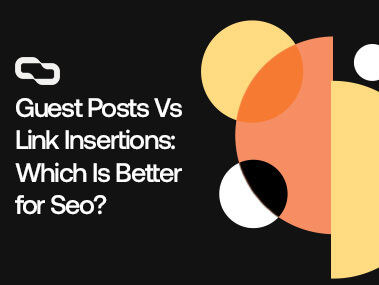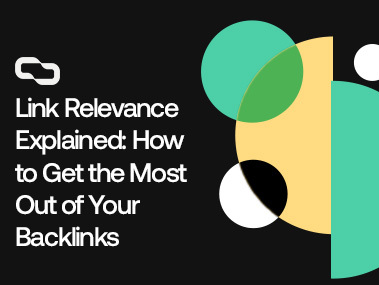Authority Links: What Are They & How to Get Them in 2024
Think of authority links as your website's best friends — the ones who have a great reputation and can make you look good just by association.
These are not just any links; they're endorsements from the web's top players, boosting your site's credibility and Google ranking.
Wondering how to win over these influential friends?
This article dives into what authority links are, why they're SEO gold, and shares practical strategies to earn these prestigious nods from the web's leading voices
Key Takeaways
Authority links are high-quality backlinks from reputable sources, such as educational institutions, government entities, and industry leaders, that enhance your site’s credibility and search engine rankings.
Various tools measure the strength of a website’s link authority, including Domain Authority by Moz, Domain Rating by Ahrefs, Trust Flow by Majestic, Authority Score by Semrush, and Alexa Rank by Amazon.
You can acquire authority links through strategies like publishing original research, creating linkable assets, engaging in digital PR, joining HARO, writing ultimate guides, guest posting, and making expert roundups.
What Are Authority Links?

Authority links are links from websites that are considered reputable, credible, and trustworthy on the internet.
These sites have established a high level of credibility and popularity in their respective fields or industries, often due to their age, size, quality, and the amount of content they provide.
Think of links from major news outlets like Forbes and The Guardian, educational institutes, government websites, and top industry websites like Ahrefs and Healthline.
The Importance of Authority Links

Authority links are highly valuable because they can significantly impact the search engine rankings of the website receiving the link.
When a high-authority site links to another website, it passes on some of its credibility and authority, signaling to search engines that the content on the receiving site is also valuable and trustworthy.
This concept is rooted in Google's PageRank algorithm, which was one of the first to use the quality and quantity of inbound links to a webpage as an indicator of its importance.
While the specifics of search engine algorithms have evolved and become more complex over time, the principle that reputable incoming links contribute to a website's authority and search rankings remains a cornerstone of SEO strategy.
Factors That Influence Link Authority
Link authority, often gauged by the impact a link has on a website's search engine ranking and domain authority, is influenced by several key factors.
These factors determine the value and trust that search engines attribute to a link.
Here's an overview of the primary factors that influence link authority:
Source Domain Authority: Links from websites with high domain authority and a diverse backlink profile are generally more valuable. A link from a well-respected, authoritative site (like a major news outlet or an academic institution) carries more weight than one from an obscure or rarely visited website.
Relevance: The relevance of the linking site and the content surrounding the link plays a critical role. Links from sites that are closely related to your site's industry or topic are more beneficial than links from unrelated sites. The context in which the link appears (such as the surrounding text or the page's overall content) also influences its authority.
Link Placement: Links embedded within the main content are typically more powerful than those placed in the footer, sidebar, or navigation menus. This is because links within the main body of a page are more likely to be editorially placed and contextually relevant.
Anchor Text: The clickable text in a hyperlink (anchor text) can influence the authority of a link. Anchor text that is descriptive and includes relevant keywords can provide search engines with additional context and help improve the linked page's search rankings. However, over-optimization of anchor text can appear manipulative and should be avoided.
Link Attribute: A "nofollow" attribute in a link tells search engines not to pass on authority from the linking to the linked page. While nofollow links can still drive traffic and have indirect SEO benefits, they don't contribute directly to link authority in the same way "follow" links do.
User Engagement: The engagement level of users with linked content can indirectly influence their perceived authority. If users click on a link and engage positively with the content (such as spending time on the page, sharing the content, or linking to it themselves), it can signal to search engines that the link is valuable and relevant.
Temporal Factors: Links from longstanding, well-established pages may carry more weight than newer links. However, fresh links can signal that the content is still relevant and valuable.
Understanding Website Link Authority: Key Metrics and Tools

Domain Authority (DA) & Page Authority (PA) by Moz
Domain Authority (DA): This domain authority metric score ranges from 1 to 100, with higher scores indicating a greater ability for the entire domain to rank on search engines. DA is calculated by evaluating multiple factors, including linking root domains and the total number of links, into a single DA score. It's useful for comparing websites or tracking the ranking strength of a website over time.
Page Authority (PA): Similar to DA but for individual pages. The PA score also ranges from 1 to 100, predicting how well a single page will rank on a search engine results page (SERP). It's influenced by various link metrics, including the number of links, the quality of links, and the strength of the linking sites.
Domain Rating (DR) & URL Rating (UR) by Ahrefs
Domain Rating (DR): Ahrefs' DR is a comparative metric that gauges the strength of a website's backlink profile. It's shown on a scale from 0 to 100, with higher numbers indicating a stronger domain authority.
URL Rating (UR): This is a page-level metric, similar to PA from Moz, and it evaluates the strength of a page's link profile on a 100-point scale. Higher UR values indicate a stronger likelihood of ranking well in search engine results.
Trust Flow (TF) & Citation Flow (CF) by Majestic
Trust Flow (TF): This metric measures the quality of links pointing to a site. It's based on the premise that trustworthy sites tend to link to other trustworthy sites. A high TF suggests that a site has links from authoritative and relevant sources in its field.
Citation Flow (CF): CF measures the influence of a site based on the number of links pointing to it, irrespective of the quality of those links. A high CF indicates that a site has many links pointing to it, suggesting it has some degree of influence or authority.
Authority Score (AS) by Semrush
SEMrush's Authority Score is a compound metric that grades the overall quality of a domain.
It combines data on backlink profiles, website traffic data, and other key metrics to provide a comprehensive view of a domain's authority.
Like other metrics, it operates on a scale from 0 to 100, with higher scores indicating higher authority.
Alexa Rank by Amazon
This is more of a popularity metric than a direct measure of authority, but it's often used in conjunction with other metrics.
Alexa Rank indicates how a website stands in terms of traffic compared to all other sites.
It's based on estimated traffic and visitor engagement over the past three months.
While not a direct authority metric, a high traffic volume and engagement level can be indicators of a site's influence and relevance.
Strategies for Building High-Quality Authority Links

Equipped with these metrics, you can now begin the process of building authority links by cultivating high-quality authority links. The path is diverse, with strategies ranging from showcasing original research to crafting impeccable content.
Let’s explore these proven tactics that open doors to authoritative backlinks and solidify your standing in the digital domain.
1. Publish Original Research
Original research acts like a magnet, attracting authoritative links much like a beacon draws moths in the dark.
Unveiling new data and insights gifts the world with valuable knowledge that others will eagerly cite and link to.
Whether through industry surveys, in-depth analyses, or comprehensive market studies, original research carves a niche for your site as a primary source of information.
When journalists and bloggers seek solid ground for their stories, they turn to your research, rewarding your efforts with citations and backlinks.
To maximize this strategy, finding a trending topic and presenting the results in a blog post format, enriched with embeddable visuals, can make your study an irresistible source for backlinks.
2. Create Linkable Assets
Linkable assets are high-quality, valuable pieces of content that naturally attract links from other websites.
The key is to create content that is not only informative and useful but also engaging and shareable.
Case studies, tools, and visually striking pieces are particularly effective, often serving as the cornerstone for links from credible websites looking for resources that resonate with their readers.
3. Utilize Digital PR
A successful digital PR campaign can transform your online presence, turning the spotlight onto your brand and drawing in a wave of website traffic and backlinks.
By sharing data-driven studies, creative campaigns, or expert insights with the media, you can captivate journalists and earn your place in their stories and, by extension, their backlinks.
4. Join HARO
Help a Reporter Out (HARO) is a platform where journalists and content creators seek expert insights and quotes for their upcoming stories.
By joining HARO and responding to relevant queries, you can get your expertise and website featured in various media outlets, earning valuable backlinks in the process.
To charm the journalists on HARO, your responses should be precise, showcase clear expertise, and offer content that’s ready for the press.
Regular participation can lead to enduring connections with journalists, opening the door to an ongoing stream of backlink opportunities and heightened visibility.
5. Create Ultimate Guides
Ultimate guides are comprehensive, in-depth resources that cover a topic extensively.
By creating content that serves as the go-to resource for a particular subject, you position your site as an authoritative source.
Such guides attract such links because they provide exhaustive information on a topic, making them valuable for other websites to reference.
6. Guest Posting
Writing articles for other websites in your industry can be an excellent way to build backlinks. Guest posting allows you to share your expertise with a new audience while securing external links to your site.
When choosing sites for guest posting, prioritize those with high authority and relevance to your niche to ensure the quality of the backlinks.
7. Create Expert Roundups
Expert roundups involve collecting insights, tips, or opinions from various industry experts on a specific topic.
These roundups are not only valuable to your audience but also encourage participants and other industry stakeholders to link to the content.
Since roundups feature various experts, they are more likely to be shared and linked to within the industry.
FAQs
What is the authority in a URL?
The authority in a URL refers to the website's domain authority, which is a ranking metric used to predict how well a website will rank on search engines. It is represented by a score from 1 to 100 and indicates the relevance of the website within its industry or with respect to a specific topic.
What is a high authority link?
A high authority link is a link from a highly trusted source. It carries a lot of credibility and trustworthiness.
What exactly is domain authority?
Domain authority is a metric that predicts a website's likelihood to rank on search engine result pages, scored on a scale from 1 to 100.
How can original research contribute to link-building?
Original research can contribute to link-building by providing valuable data and insights that other websites, bloggers, and journalists will want to reference, leading to natural backlinks to the original source of the research.
Are nofollow links worthless for SEO?
No, nofollow links are not worthless for SEO. They may not pass on link authority directly, but they can still drive traffic and have indirect SEO benefits. So, they shouldn't be overlooked.
Conclusion
Securing authority links can be a game-changer for your site's SEO and credibility.
While we've laid out the groundwork and shared key strategies, remember, every site's path is unique.
If the idea of boosting your site's authority feels daunting or you're curious about custom strategies, we're here to assist.
Consider booking a free 15-minute consultation with our link-building experts.
We'll dive into your site's specifics, brainstorm strategies, and set you up with actionable steps to elevate your link profile.
Don't let this chance slip by—book your free consultation today and start your journey to SEO excellence!
Find out your exact cost of ranking for your dream keyword
Let’s get you ranking now
If you want the team at Get Me Links to help you get more traffic



